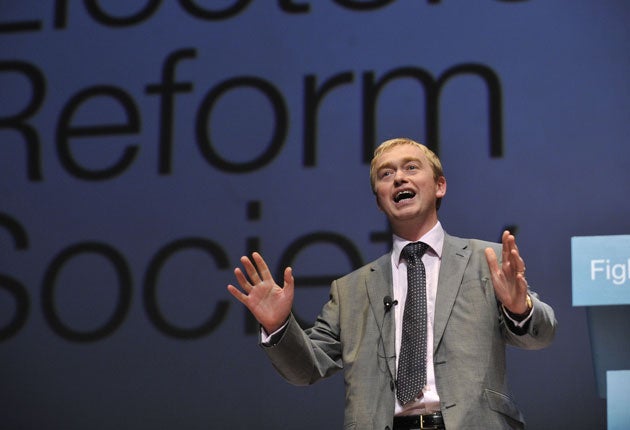Greens and NUS to mount electoral assault on Lib Dems

The Liberal Democrats are facing twin electoral assaults from the Green Party and the National Union of Students in the wake of the party's U-turn on tuition fees
The Independent understands the Greens are drawing up a strategy to target Liberal Democrat MPs in the most marginal seats – a move which could potentially unseat up to 10 per cent of the party's MPs.
The Greens are unlikely to win the seats but they could do what UKip has done to the Conservatives and win enough votes to deprive the Liberal Democrats of a majority in several seats across the country.
At the same time the NUS has announced plans to target high profile Liberal Democrat-held constituencies with large student populations including Nick Clegg's constituency of Sheffield Hallam and Don Foster's in Bath. They are also considering putting up a candidate in the Oldham East and Saddleworth by-election – which the Liberal Democrats hope to win from Labour following the ejection of former immigration minister Phil Woolas. The election will be the first big test of the Coalition's popularity.
The Liberal Democrats, who have 57 MPs, are particularly vulnerable to the Greens in three key university seats: Norwich South, Manchester Withington and Cambridge.
In Norwich, the Liberal Democrat candidate Simon Wright won a surprising victory in May to clinch the seat with a majority of 310. The Greens polled nearly 15 per cent of the vote and it would take only a tiny swing to deprive Mr Wright of his seat.
If the Liberal Democrat vote collapsed it is possible that Adrian Ramsay – the Green candidate and deputy leader of the party – could even win.
The party also has a small majority in Manchester Withington – a seat with a high proportion of students. Although the Greens only polled 978 votes at the last election it would only take another 1,000 dissatisfied Liberal Democrats to vote Green to unseat John Leech and hand the seat to Labour.
Likewise in Cambridge Julian Huppert could be vulnerable. Although he has a majority of over 6,000, the Green Party has a strong base in the city. Last time round the seat was contested by Tony Juniper who polled nearly 4,000 votes.
A further three Liberal Democrat MPs have majorities of less than 500 in seats where at the last election the Greens did not field candidates. If they were to do so this time round they would be highly vulnerable. Caroline Lucas, leader of Greens, who herself became the first Green MP earlier this year, said discussions were underway in the party on how best to target Liberal Democrat voters.
"This is not an eventuality that has passed us by," she said. "Targeting Liberal Democrat voters is something we have been discussing as part of out election strategy. If you look at the seats where the Greens do well its true to say that the Libs Dems do less well."
The Liberal Democrat leadership is also facing internal pressures. On Saturday the party elected Tim Farron as its new president. He said it was important that the coalition was able to explain its message both to members and the wider public. "The difficulty is how do you deal with that transition for a party which has spent the last four generations out of power.
"We're not a pure as the pure driven snow any more by the sheer fact of being in power. Your average Liberal Democrat member is excited by the reality of getting things done in power and also extremely nervous."
Partly as a result of internal pressure Vince Cable is to adopt a high-risk approach to the critical Commons vote on tuition fees.
The Liberal Democrat Business Secretary will allow a full-scale Commons debate and vote on the plan shortly before the House starts its Christmas recess on 21 December. Under Commons rules, he could have railroaded through the proposed rise in a two-hour debate ending in a yes or no vote.
But in a concession to Liberal Democrat MPs who oppose the increase, he has decided to allow a four-hour debate on a government motion to which amendments can be tabled. This will enable the Opposition to propose an alternative – such as a graduate tax – in the hope of attracting Liberal Democrat support.
In the wake of last week's student protest at Westminster, allies said Mr Cable wanted to ensure a full debate and not face accusations of rushing through the fees rise. Although Liberal Democrat whips believe the party's backbench critics are gradually being won over, one source admitted yesterday: "It is still very tight."
Mr Cable faced a dilemma over how to push through the shake-up of higher-education funding. The sweeteners in his package, including measures such as scholarships to help children from poor backgrounds, require legislation, but that will not be passed until next year. They will be spelt out in a White Paper, expected in January, to be followed by a consultation process.
The fees rise does not require legislation. However, it needs to be approved quickly so universities can plan for their introduction for new students in the autumn of 2012. Mr Cable hopes the Government's decision to impose a £9,000-a-year cap on fees will help to defuse the Liberal Democrat rebellion. He rejected the proposal by Lord Browne for an open-ended rise in fees.
Join our commenting forum
Join thought-provoking conversations, follow other Independent readers and see their replies
Comments